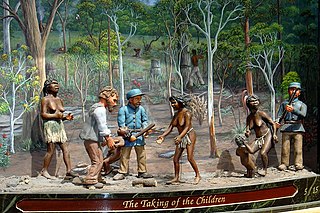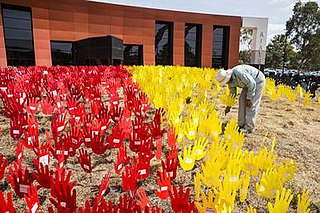
The Stolen Generations were the children of Australian Aboriginal and Torres Strait Islander descent who were removed from their families by the Australian federal and state government agencies and church missions, under acts of their respective parliaments. The removals of those referred to as "half-caste" children were conducted in the period between approximately 1905 and 1967, although in some places mixed-race children were still being taken into the 1970s.

Edward Koiki Mabo was an Indigenous Australian man from the Torres Strait Islands known for his role in campaigning for Indigenous land rights in Australia, in particular the landmark decision of the High Court of Australia that recognised that indigenous rights to land had continued after the British Crown acquired sovereignty and that the international law doctrine of terra nullius was not applicable to Australian domestic law. High court judges considering the case Mabo v Queensland found in favour of Mabo, which led to the Native Title Act 1993 and established native title in Australia, officially recognising the rights of Aboriginal and Torres Strait Islander people in Australia.
Native title refers to rights, recognised by Australian law, held by Aboriginal and Torres Strait Islander groups or individuals to land that derive from their maintanence of their traditional laws and customs. These Aboriginal title rights were first recognised as a part of Australian common law with the decision of Mabo v Queensland in 1992. The doctrine was subsequently implemented and modified via statute with the Native Title Act 1993.

Marion Rose Scrymgour is an Australian politician and the current MP for Lingiari. She was a member of the Northern Territory Legislative Assembly from 2001 to 2012, representing the electorate of Arafura. She was the Labor Party Deputy Chief Minister of the Northern Territory from November 2007 until February 2009, and was the highest-ranked Indigenous Australian woman in government in Australia's history. She was also the first Indigenous woman to be elected to the Northern Territory legislature.

The Australian Institute of Aboriginal and Torres Strait Islander Studies (AIATSIS), established as the Australian Institute of Aboriginal Studies (AIAS) in 1964, is an independent Australian Government statutory authority. It is a collecting, publishing and research institute and is considered to be Australia's premier resource for information about the cultures and societies of Aboriginal and Torres Strait Islander peoples. The institute is a leader in ethical research and the handling of culturally sensitive material and holds in its collections many unique and irreplaceable items of cultural, historical and spiritual significance. The collection at AIATSIS has been built through over 50 years of research and engagement with Aboriginal and Torres Strait Islander communities and is now a source of language and culture revitalisation, native title research and family and community history. AIATSIS is located on Acton Peninsula in Canberra, Australian Capital Territory.

Larissa Yasmin Behrendt is an Australian legal academic, writer, filmmaker and Indigenous rights advocate. As of 2022 she is a professor of law and director of research and academic programs at the Jumbunna Institute for Indigenous Education and Research at the University of Technology Sydney, and holds the inaugural Chair in Indigenous Research at UTS.

Canadian Aboriginal law is the body of law of Canada that concerns a variety of issues related to Indigenous peoples in Canada. Canadian Aboriginal Law is different from Canadian Indigenous law: In Canada, Indigenous Law refers to the legal traditions, customs, and practices of Indigenous peoples and groups. Aboriginal peoples as a collective noun is a specific term of art used in legal documents, including the Constitution Act, 1982, and includes First Nations, Inuit and Métis people. Canadian Aboriginal law provides certain constitutionally recognized rights to land and traditional practices. Canadian Aboriginal Law enforces and interprets certain treaties between the Crown and Indigenous people, and manages much of their interaction. A major area of Aboriginal law involves the duty to consult and accommodate.
Diane Robin (Di) Bell is an Australian feminist anthropologist, author and activist. She is Professor Emerita of Anthropology at the George Washington University in Washington, D.C, USA and Distinguished Honorary Professor of Anthropology at the Australian National University, Canberra. Her work focuses on the Aboriginal people of Australia, Indigenous land rights, human rights, Indigenous religions, violence against women, and on environmental issues.
George Newhouse is an Australian human rights lawyer and a former local councillor. He is the principal solicitor of the National Justice Project, a human rights and social justice legal service, and currently an Adjunct Professor of Law at Macquarie University. and at the University of Technology Sydney.
Indigenous Australians are people with familial heritage from, and membership in, the ethnic groups that lived in areas within the Australian continent before British colonisation. They consist of two distinct groups: the Aboriginal peoples of the Australian mainland and Tasmania, and the Torres Strait Islander peoples from the seas between Queensland and Papua New Guinea. The term Aboriginal and Torres Strait Islander peoples or the person's specific cultural group, is often preferred, though the terms First Nations of Australia, First Peoples of Australia and First Australians are also increasingly common; 812,728 people self-identified as being of Aboriginal and/or Torres Strait Islander origin in the 2021 Australian Census, representing 3.2% of the total population of Australia. Of these Indigenous Australians, 91.4% identified as Aboriginal; 4.2% identified as Torres Strait Islander; while 4.4% identified with both groups. Since 1995, the Australian Aboriginal flag and the Torres Strait Islander flag have been official flags of Australia.

David Selvarajah Vadiveloo is an Australian lawyer, human rights and education consultant, cultural broker and screen producer.
Magabala Books is an Indigenous publishing house based in Broome, Western Australia.
Jillian Debora Milroy, AM is an Australian Aboriginal academic specialising in traditional forms of knowledge, including storytelling. She is of Palyku descent. Of her siblings, Sally Morgan is an author and artist, Helen Milroy is a child psychiatrist who was the first indigenous Australian to become a medical doctor, David is a playwright, and William has worked as a senior public servant.

Elizabeth Grant CF was an Australian architectural anthropologist, criminologist and academic working in the field of Indigenous Architecture. She was a Churchill Fellow and held academic positions at The University of Adelaide, as Associate Professor of Architecture and Urban Design at RMIT University's RMIT School of Architecture and Design, Adjunct Professor at the University of Canberra and the University of Queensland. She researched, wrote, and was an activist focused on architecture and design with Indigenous peoples as architectural practice and a social movement, and the observance of human rights in institutional architecture. Her expertise in Indigenous housing and homelessness, design for Indigenous peoples living with disability, and indigenising public places and spaces made her a regular guest on the Australian Broadcasting Corporation's Radio National and ABC Local Radio. She wrote and reviewed architectural projects for architectural magazines such as Architecture Australia, the journal of the Australian Institute of Architects, and the Australian Design Review.

Megan Jane Davis is an Aboriginal Australian activist and international human rights lawyer. She was the first Indigenous Australian to sit on a United Nations body, and was Chair of the UN Permanent Forum on Indigenous Issues. Davis is Pro Vice-Chancellor, Indigenous, and Balnaves Chair in Constitutional Law at the University of New South Wales. She is especially known for her work on the Uluru Statement from the Heart.
Felicity Meakins is a linguist specialising in Australian Indigenous languages, morphology and language contact, who was one of the first academics to describe Gurindji Kriol. As of 2022, she is a professor at the University of Queensland and Deputy Director of the University of Queensland node of the Australian Research Council (ARC) Centre of Excellence for the Dynamics of Language. She holds an ARC Future Fellowship focusing on language evolution and contact processes across northern Australia.

Lidia Alma Thorpe is an Australian independent politician. She has been a senator for Victoria since 2020 and is the first Aboriginal senator from that state. She was a member of the Australian Greens until February 2023 when she quit the party over disagreements concerning the proposed Indigenous Voice to Parliament. She had also served as the Greens' deputy leader in the Senate from June to October 2022.

Jody Broun is an Indigenous Australian artist and activist with a long-standing career, most recently with her current position being Chief Executive Officer of the National Indigenous Australians Agency. She has completed a Diploma of Teaching, Bachelor of Education and a Masters in Philosophy. In 1998 she was awarded first prize in the Telstra National Aboriginal and Torres Strait Islander Art Award for her artwork "White Fellas Come To Talk Bout Land" and in 2005 Broun was awarded first place in the Canberra Art Prize for her artwork "Half-Time Game". Along with these major awards Broun has displayed many artworks in solo and group exhibitions, winning many other awards, and grants. Broun is a Yindjibarndi woman with family connection from the Pilbara region in North Western Australia, and is known for her dedication to Indigenous communities in Australia.
Banduk Mamburra Wananamba Marika, known after her death as Dr B Marika, was an artist, printmaker and environmental activist from Arnhem Land, Northern Territory, Australia, who was dedicated to the development, recognition and preservation of Indigenous Australian art and culture. She was the first Aboriginal person to serve on the National Gallery of Australia's board.
Kirstie Parker is a Yuwallarai journalist, policy administrator and Aboriginal Australian activist. From 2013 to 2015 she served as the co-chair of the National Congress of Australia's First Peoples and during her tenure pressed for policies that allowed Aboriginal and Torres Strait Islander Australians to gain the ability for self-determination.










